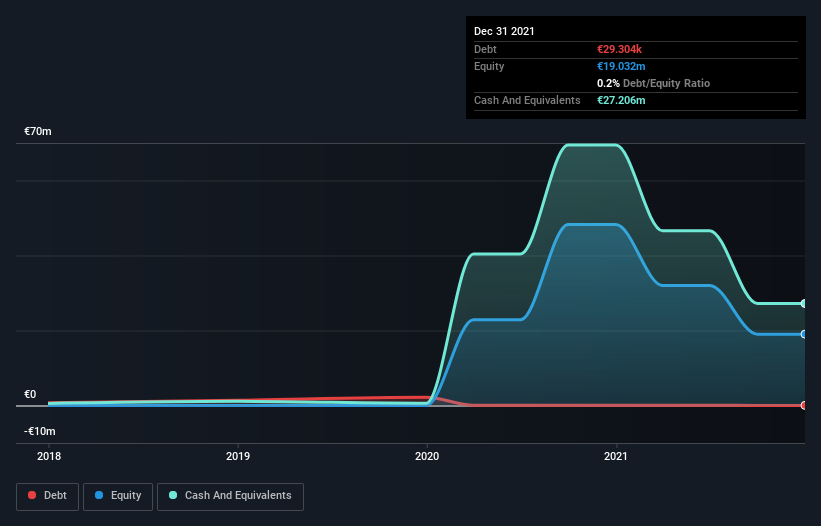Here's Why We're Watching Exasol's (ETR:EXL) Cash Burn Situation
Just because a business does not make any money, does not mean that the stock will go down. For example, although Amazon.com made losses for many years after listing, if you had bought and held the shares since 1999, you would have made a fortune. But the harsh reality is that very many loss making companies burn through all their cash and go bankrupt.
So should Exasol (ETR:EXL) shareholders be worried about its cash burn? In this article, we define cash burn as its annual (negative) free cash flow, which is the amount of money a company spends each year to fund its growth. We'll start by comparing its cash burn with its cash reserves in order to calculate its cash runway.
See our latest analysis for Exasol
Does Exasol Have A Long Cash Runway?
A company's cash runway is the amount of time it would take to burn through its cash reserves at its current cash burn rate. As at December 2021, Exasol had cash of €27m and such minimal debt that we can ignore it for the purposes of this analysis. Looking at the last year, the company burnt through €41m. Therefore, from December 2021 it had roughly 8 months of cash runway. Importantly, analysts think that Exasol will reach cashflow breakeven in 2 years. That means unless the company reduces its cash burn quickly, it may well look to raise more cash. You can see how its cash balance has changed over time in the image below.

How Well Is Exasol Growing?
Notably, Exasol actually ramped up its cash burn very hard and fast in the last year, by 187%, signifying heavy investment in the business. That does give us pause, and we can't take much solace in the operating revenue growth of 16% in the same time frame. Taken together, we think these growth metrics are a little worrying. While the past is always worth studying, it is the future that matters most of all. For that reason, it makes a lot of sense to take a look at our analyst forecasts for the company.
How Easily Can Exasol Raise Cash?
Given the trajectory of Exasol's cash burn, many investors will already be thinking about how it might raise more cash in the future. Companies can raise capital through either debt or equity. Commonly, a business will sell new shares in itself to raise cash and drive growth. By comparing a company's annual cash burn to its total market capitalisation, we can estimate roughly how many shares it would have to issue in order to run the company for another year (at the same burn rate).
Exasol has a market capitalisation of €101m and burnt through €41m last year, which is 40% of the company's market value. That's high expenditure relative to the value of the entire company, so if it does have to issue shares to fund more growth, that could end up really hurting shareholders returns (through significant dilution).
Is Exasol's Cash Burn A Worry?
On this analysis of Exasol's cash burn, we think its revenue growth was reassuring, while its increasing cash burn has us a bit worried. Shareholders can take heart from the fact that analysts are forecasting it will reach breakeven. Considering all the measures mentioned in this report, we reckon that its cash burn is fairly risky, and if we held shares we'd be watching like a hawk for any deterioration. Taking a deeper dive, we've spotted 2 warning signs for Exasol you should be aware of, and 1 of them is a bit unpleasant.
Of course, you might find a fantastic investment by looking elsewhere. So take a peek at this free list of companies insiders are buying, and this list of stocks growth stocks (according to analyst forecasts)
Valuation is complex, but we're here to simplify it.
Discover if Exasol might be undervalued or overvalued with our detailed analysis, featuring fair value estimates, potential risks, dividends, insider trades, and its financial condition.
Access Free AnalysisHave feedback on this article? Concerned about the content? Get in touch with us directly. Alternatively, email editorial-team (at) simplywallst.com.
This article by Simply Wall St is general in nature. We provide commentary based on historical data and analyst forecasts only using an unbiased methodology and our articles are not intended to be financial advice. It does not constitute a recommendation to buy or sell any stock, and does not take account of your objectives, or your financial situation. We aim to bring you long-term focused analysis driven by fundamental data. Note that our analysis may not factor in the latest price-sensitive company announcements or qualitative material. Simply Wall St has no position in any stocks mentioned.
About XTRA:EXL
Exasol
Develops database for analytics and data warehousing in Germany, Austria, Switzerland, Great Britain, North America, and internationally.
Flawless balance sheet with high growth potential.
Similar Companies
Market Insights
Community Narratives



